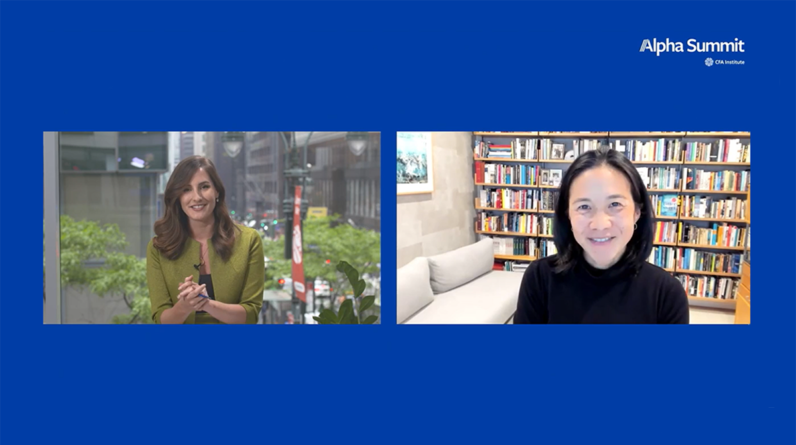
What’s more important to success — talent or effort?
Most of us would say talent. But according to psychologist and bestselling author Angela Duckworth, most of us would be completely wrong.
That’s one of the key takeaways from her bestselling book Grit: The Power of Passion and Perseverance. In an interview with Rosanna Lockwood at the Alpha Summit GLOBAL from CFA Institute, Duckworth, who is also founder and CEO of Character Lab and co-director at the Penn-Wharton Behavior Change for Good Initiative, explained what her research has revealed about the nature of success and how talent and grit contribute to it.
From an early age, Duckworth came to understand our tendency to overvalue talent. Her parents’ obsessive focus on success and achievement was a key factor.
“It was talked about all the time in our house,” she said. “Who was the most successful person in our family? Who is the most successful of our cousins? Who is the brightest physicist who ever lived? Who is the greatest painter who ever lived?”
Her father especially viewed talent as almost synonymous with eventual achievement.
But Duckworth took a different tack. “I grew up to become a psychologist who studies pretty much everything that is not your innate talent, your gifts,” she said. “This common denominator that I have identified in high achievers, whether they’re athletes or musicians or investors, is grit.”
The basic concept of grit sounds very simple: “passion and perseverance for long-term goals” in Duckworth’s words. But it gets tricky. “This quality of grit is malleable, and it is not correlated at all with measures of talent,” she said.
So, not only do we have to overcome the belief that talent defines our potential and limits what we can achieve, but we also have to reframe how we think about making the most of our talents.
Consider the so-called 10,000-hour rule. That concept, based on a single study of German musicians, created the misconception that mastery could be achieved simply by putting in the time. But that’s an oversimplification. The actual study found that a very specific and extremely demanding type of practice differentiated the superior from the very good, that the quality of effort over time matters at least as much as the sheer amount of time.
Interpreting these findings through the lens of “grit,” Duckworth broke down the principle into three elements:
- Concentrate on one specific aspect of overall performance and make deliberate efforts to improve it.
- Focus on this effort with 100% intensity, with no multitasking, because half-hearted or mindlessly rote “practice” will not suffice.
- Solicit continuous feedback on how to do better and repeat steps 1 through 3 relentlessly until excellence is achieved.
This all might sound like pure persistence. But grit has another critical component: passion. “Happiness and grit and success are all related,” Duckworth said. “Can you become truly world class by doing thousands and thousands of hours of this kind of difficult deliberate practice without loving what you do?”
So, there’s nothing magical about the 10,000-hour rule. But there is something magical about hours upon hours spent in high-quality practice.
Persistence + Passion = Success?
Still, there’s more to the grit equation. Yes, persistence pays off, but most of us still conceive of talent as a rigid, inflexible substance. Duckworth’s research has explored how this mindset influences us, and the hardest part of achieving true grit may be understanding that our abilities are more malleable than we imagine.
“Your grit, your curiosity, your humility — there’s nothing about you that is completely fixed when it comes to your mindsets, to your habits, your character,” she said.
In Duckworth’s studies, “success” is always defined as objectively possible through countable or measurable criteria. But the malleable nature of our potential is more subjective and depends on conviction. The only way to measure it is to have the passion to persevere in pursuit of something difficult for a long time. Throughout the process, we simply cannot know whether such hyper-focused effort will lead to success. Our preconceptions about the limits of our abilities may constrain us more than our innate abilities.
But there is another subjective factor: happiness.
Aerodynamic Pursuit
“Happiness and success must be related, but they’re not the same thing. Happiness is how you feel about your life. It’s subjective, not objective,” Duckworth said. “Grit not only predicts objective measures of success, but it also predicts subjectively feeling happy, feeling a lot of positive emotion on a daily basis, and also feeling overall satisfied with your life.”
So, what will make us happy is grinding persistence in pursuit of achieving some kind of unknown potential that can only be realized after years of sacrifice? As counterintuitive as it may seem, that is exactly what Duckworth’s research suggests.
“I think what it really is to be gritty is to have some alignment in your goals, and so you have the opposite of conflict — that you’re aerodynamically pursuing things with a lot of enthusiasm,” she explained. “There’s a wonderful harmony when you feel like what you’re pursuing aligns with your values and aligns with your interests, it aligns with how you’re spending your time. And that’s what I find about very gritty people.”
As for achieving happiness, a sense of purpose may be more important than material wealth. “What really motivates people? More than money, honestly, it’s mattering,” Duckworth said. “It’s mattering and being useful and being appreciated by other people.”
There’s more. Not only are gritty people happier, but they also tend to score high on other virtues. “There is a positive correlation between grit and kindness, gratitude, empathy, curiosity, and more,” she said. “These things are positively correlated, but they’re not exactly the same. So, we should be reminded of the importance of ethics and other people.”
Beyond Individual Achievement
Grit is not developed in isolation but in a context. And culture is a critical element of that process, according to Duckworth. Shared beliefs, values, and rituals at the national, local, and family levels all can contribute. Without the right environment, grit alone may not be enough.
So, if you want to be grittier, more humble, or more anything, you need to find a place where that is more the norm. “If you find yourself in a culture where you are constantly swimming against the current, when you’re constantly trying to be something that nobody else cares about, nobody else personifies, you’ll find you get very tired,” she said. “And then, eventually, the current takes you.”
This aspect of grit poses a challenge for leaders. Organizational cultures can discourage grit and encourage toxic behaviors. In her book, Duckworth details company cultures that prioritized “talent” over everything else. Narcissists tended to thrive at the expense of their more humble and steadfast counterparts whose qualities correlated more with long-term success. This often led to dysfunctional workplaces and even business failure.
The lesson then is that many organizations may be looking for the wrong qualities when recruiting their personnel. Duckworth’s study of an intensive, first-summer program at the US Military Academy at West Point is instructive in this regard. West Point’s leaders rated such “talent” factors as test scores and athletic achievement higher than more grit-associated qualities. But Duckworth found that talent had virtually no correlation with whether a cadet succeeded in that summer program. Grit, however, had more predictive value.
Unfortunately, there is no standardized test for grit, so employers will need to look more carefully at candidates’ histories and accomplishments. “In a high-stakes setting like hiring,” she said, “I think my very best idea at this point is to look at somebody’s resume.”
Duckworth recommends hiring managers keep an eye out for candidates who have fulfilled multi-year commitments, demonstrate upward progression, and have shown passion and perseverance in pursuit of long-term goals.
Of course, a grit-centered culture is not an antidote to toxic behavior. “It is possible to be very, very gritty and maintain ethics,” she said. “It’s possible to be very, very gritty and completely unethical.”
That’s why an emphasis on ethics is hugely important. Whatever kind of team is being built, there needs to be focus on a higher goal.
“It all has to ultimately serve some ethical purpose,” she said.
Coda
Our bias towards talent intersects with another one of our biases: ageism. While many people believe older people are less adaptable, flexible, innovative, and creative, Duckworth’s research and personal observations tell a very different story.
“No matter how old you are or where you are or who you are, you can change,” she said. “You can improve.” She cites the example of Daniel Kahneman, who won a Nobel Prize in economics for his pioneering work on behavioral finance. Well into his 80s, he is still passionately pursuing new interests.
“Danny Kahneman is just as in love with research as he was as a young man, and he is working just as hard as he used to,” she said. “And it’s voluntary.”
If age hasn’t stopped Kahneman, it shouldn’t stop us, either.
“There is no time/date stamp on when grit runs out or when it’s not age appropriate,” she said. “I think it’s a wonderful way to live your life.”
If you liked this post, don’t forget to subscribe to the Enterprising Investor.
All posts are the opinion of the author. As such, they should not be construed as investment advice, nor do the opinions expressed necessarily reflect the views of CFA Institute or the author’s employer.
Professional Learning for CFA Institute Members
CFA Institute members are empowered to self-determine and self-report professional learning (PL) credits earned, including content on Enterprising Investor. Members can record credits easily using their online PL tracker.












